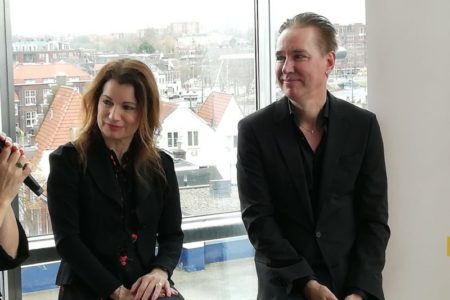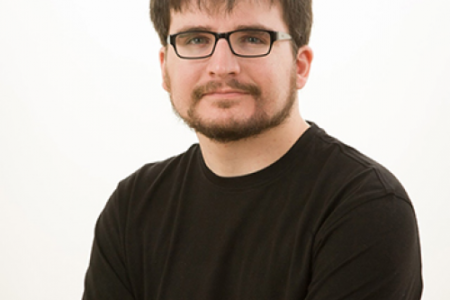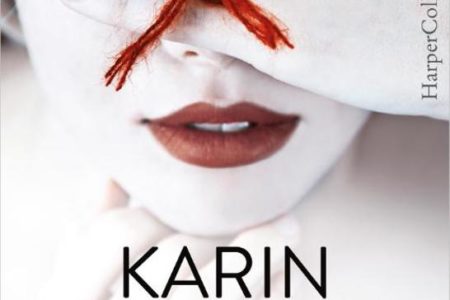Thrillers & More sat down with David Hewson and talked with the author about Amsterdam, Italy, writing and the Dutch.
& More sat down with David Hewson and talked with the author about Amsterdam, Italy, writing and the Dutch.
You really, really love Amsterdam, why is that?
Amsterdam is a very interesting city and the fact there are all these different areas, that have all these different characters – it’s fascinating. It’s not homogenous, where everything is the same. You go from [a neighbourhood like] De Pijp over to the Jordaan and everywhere is different. There is a bit of local rivalry amongst them, like ‘my bit of Amsterdam is better than your bit of Amsterdam’. It’s a very human city.
I have always enjoyed coming here. I came here as a journalist before I was writing books. The Dutch really liked my books in the very early days of the Italian series. You’re great booklovers in a way that other nations aren’t anymore. Books are still valued here and people like different sorts of books, whereas certainly in the UK and the US books have been devalued by discounting and it’s much more homogeneous: it is much more driven by the algorithms of what is selling. You have independent booksellers, which we don’t have. It is a real book culture, which is a delightful thing to experience, because you don’t get it in that many places anymore. The Antwerp Book fair, for example, is visited by about 120.000 people and they are readers, there’s nothing like that. Helsinki do one, which is similar, but there is nothing like that in the UK.
 So that’s what I wanted to do after I had done The Killing books in Copenhagen. I wanted to do something a bit different. And at the time I was here to do some promotion for The Killing, and I thought: why not do it in Amsterdam? I mentioned it to my editor and he looked at me like I was mad and went ‘really?’. One of the great things about being an outsider looking at the city, you see it much more intensely than someone who lives here. That’s why I like to write about places I don’t know. There is this awful cliché that says, ‘write about what you know’ and I think it is terrible advice, because if you write about what you know, you take it for granted. You don’t look at it that closely, whereas with Amsterdam I have to work very hard to get it right. Most foreign writers who set stories abroad will have the protagonist being from their own country. I don’t think that’s very interesting, it’s probably easier, probably less work. Every book has to be a challenge, every new book has to be harder than the last one.
So that’s what I wanted to do after I had done The Killing books in Copenhagen. I wanted to do something a bit different. And at the time I was here to do some promotion for The Killing, and I thought: why not do it in Amsterdam? I mentioned it to my editor and he looked at me like I was mad and went ‘really?’. One of the great things about being an outsider looking at the city, you see it much more intensely than someone who lives here. That’s why I like to write about places I don’t know. There is this awful cliché that says, ‘write about what you know’ and I think it is terrible advice, because if you write about what you know, you take it for granted. You don’t look at it that closely, whereas with Amsterdam I have to work very hard to get it right. Most foreign writers who set stories abroad will have the protagonist being from their own country. I don’t think that’s very interesting, it’s probably easier, probably less work. Every book has to be a challenge, every new book has to be harder than the last one.
Do you set your sights higher every time?
I’m not sure I set them higher, but I was determined that every book should be different to the previous one, even when it’s in the series. You can’t just keep running on the same template. Even with series books I approach each one in a different fashion. For this one I wanted to come back into Amsterdam, but I particularly wanted to focus on that working-class district that was being destroyed by gentrification. I think that’s quite an important social topic and the effect it has on working-class people, who are losing their community and how they are going to deal with that. So, each one I want to be very different. Otherwise you can end up writing the same thing over and over.
When you start writing a story, do you have the whole thing planned out in your head, or do you just let the story take you?
Kind of. My approach is like climbing Everest. When you climb Everest, you don’t keep looking at the top of Everest, you’re thinking of the waypoints. So, I will think of it in terms of the shape of the story and what the waypoints are going to be that will take us to it. I will always have an ending in mind, but you have to listen to your characters when you’re writing. They’re not puppets. You have to listen to them when they say ‘ I wouldn’t do that or I wouldn’t go there’. Because that’s when it gets interesting. The ending of Stenen Engel, I had no idea it was going to end like that until about two-thirds of the way through. It’s a funny process. I want to discover myself while I’m writing it, not plan it all out, like some people do. Everyone’s different. I’m trying to write crime stories that are also novels. I don’t think that popular culture needs to be simple or dumb, you can make it as rich and as textured as a novel, as literature. I try to build in that kind of richness, which means you don’t need to plan it out in that kind of detail.
The human side of things, that’s really what I want to write. It’s about ordinary people and ordinary responses. Some people say ‘I never read crime because it’s too simple and too plot driven’ and I’m trying to reach people who perhaps wouldn’t normally read crime. I’m fortunate for having publishers who allow me to go down that route. It´s important that a writer establishes his or her identity: you don´t just chase the market. There´s an awful lot of that going on, certainly in the UK. Girl on a train episode 971, that keeps going on and on. That´s just not my scene.
 You mentioned The Killing earlier, what was it like to write a book about a story that was already written?
You mentioned The Killing earlier, what was it like to write a book about a story that was already written?
Really interesting. The first thing I said after ‘how much?’ was ‘ I’ll only do it if you let me change it’. Because I knew there were things that had to be changed. If you take a book and turn it into tv, they have to change it, because they are different media. The Danes agreed to it. I had a completely free hand. There was no script, the scripts had all been destroyed. All I had was the DVD and this very unsatisfactory subtitling, which did not reflect the actual dialogue at all. So, I basically rewrote the dialogue, I rewrote the story, I rewrote the endings, because I thought the tv endings would not work in book form. Every Killing book has a totally different ending to what you got on tv. That kind of freedom meant that it was as if somebody had given me a rough outline of the book and I was free to do what I wanted with it. My Sarah Lund isn’t really the same as the Sarah Lund on screen, because she´s quite funny at times and the one on screen is not. It was educational to see how tv approached storytelling in terms of scenes and all these interwoven threads, the A, B and C threads. I learned a lot from that.
Would you do it again, if someone asked you?
No. The money was awful. And those books sold all over the world and I haven’t seen a penny in royalties. Somebody’s made a lot of money out of it, but it’s not me.
They called it a novelisation. It wasn’t a novelisation, it was an adaptation – because I changed so much – and they were huge books as well, the first one was 20 hours. Even when I cut and cut it, it still turned out the longest thing I ever wrote. But also, no tv company will ever give me that freedom and say ‘you can do what you like with it’. I really enjoyed doing them, but it was a lot of hassle. You can’t just photocopy tv and put it on a page, it just doesn’t work like that. It was interesting to do those things and I learned a lot about it and it certainly shaped the way I write now. I write very much in a scene-based way and I often split points of view and things like that. And I´ve done some script work for various things. It broadened my range a bit. I´m glad I did it, but I won´t do it again.
 Is it difficult to distinguish between the different stories and cultures? Like Amsterdam, Rome or Copenhagen?
Is it difficult to distinguish between the different stories and cultures? Like Amsterdam, Rome or Copenhagen?
No, not really. Basically, these things will take up to a year, and for that year I just absorb, immerse myself completely in the story I’m writing. When I was writing Stenen Engel, I must have come back four times, spent a month around the market and thinking about nothing else. I never multitask, never take on anything else.
What I’m finishing now is this Italian one. And research I did a while back, that’s all there. I take photographs. It’s in this extraordinary part of Calabria, which is at the very toe of Italy. I wanted to do it there, because it’s got this amazing culture. It was all part of Greece before the Romans came along – Syracuse, Sicily. In the mountains they still speak a form of Greek, which is closer to the Greek of Homer than modern demotic Greek. They still have kind of semi-pagan customs and they have the nastiest crime organisation in Italy with the totally unpronounceable name ‘Ndrangheta, which again is Greek – that’s the mafia. There’s Cosa Nostra in Sicily, there’s the Camorra in Naples, and there’s the ‘Ndrangheta in Callabria. The ‘Ndrangheta are bigger and more successful and own a large part of Brussels, but nobody’s really heard of them because there’s no movies about them and they’re very quiet… They’re almost like a kind of social organisation or an alternative government. So, there’s a lot to write about. The story is that the big boss has decided to give himself up and the Romans have to go down there and work out a way to get him out, because if his own people knew they’d kill him. They don’t know the guy’s name, they don’t have a picture of him, he’s just a complete shadow, and Nic Costa is told he has to join the gang and pretend to be a gangster to get him out. It’s a story about people thinking they’re in control. They’re like cops when they’re at work, they’re in charge, but when they go down to Calabria they’re not.
It’s a kind of psychological story: it’s not cops and robbers, it’s not whodunnit, there are no car chases. It’s very much the story of people being forced to be something they’re not and finding out what happens there. It’s probably more a novel than it is a thriller. Obviously, it’s what people make of it.
Is there a chance of Nic Costa and Pieter Vos ever meeting up in some way?
No, not at all. I don’t do that kind of thing. Why would you do that? There’s enough going on in Amsterdam to keep Peter Vos busy. And I always try to build a fence around a story and never set foot outside that. It forces you as a writer to think about the characters and the story and you can’t get away with things like people hopping on a plane, just to fill things up. It does make it quite claustrophobic, but there are certain things I don’t change with every book and the geography is one of them. Although in the Costa book, while that’s set in Calabria, it ends in a different part of Italy. But that’s just how the story goes.
 What do you like to read when you’re not writing?
What do you like to read when you’re not writing?
This year I’ve been writing pretty much the entire year. It’s been an incredibly busy year. I like to read a lot of non-fiction, I really like history. I’m currently reading Mary Beard’s SPQR, which is about the history of Rome. It’s a very good book, she’s a very good writer. She’s an academic, but she explains things to us very well. I quite like that period of history because it’s very reminiscent of today: everything’s falling apart, you have lunatic right-wing leaders, populism and lunacy. I tend to read a lot of history. The last fiction I’ve read before that was Robert Harris’ trilogy about Cicero, which again is very much the same kind of thing. I tend not to read other kinds very often, because if you’re writing it you have to be careful that you don’t subconsciously pick something up.
How do you come up with your characters?
I steal them. Like the guy in the new book, Jordy, the bad guy in the market. I was walking across a bridge just by the Rijksmuseum and there was this huge guy, with a black leather jacket, about 55, silver hair, a ponytail out the back, and I just thought ‘I’ll have you’. I took a picture of him and thought ‘that’s Jordy’. I don’t know who he was. Perhaps he was a doctor, I have no idea.
Sometimes you just see somebody and think ‘I’ll just have them’. The market is just full of blokes who could be Bert, they’ve all got the muscles. You see them putting up the stalls and taking them down. And Vos just came around because I was sitting at a bar called De Eiland and this guy cycled by the window on this rusty bike. He looked a complete mess, but at the front of the bike, in the basket, was this dog. This must have been 10 years before I started writing it, I just made a note about a guy who thought his life had kind of come to an end. But when you looked at him from the outside, you’d realize that couldn’t be true because he had this dog. If he was totally lost, he wouldn’t leave a dog like that.
Do you think the books would have worked in a London setting?
I´ve never wanted to write a story set in the UK, because there´s so many people writing that kind of book: inspector What´s-his-name, they´ll give them some unique characteristic, maybe they´ll be gay and have one leg or whatever. I don’t feel I’d have anything new to add to all that. Maybe I’d make more money if I did. It’s a very crowded field. And I don’t like the mainstream, I don’t like being in the mainstream. I like to do something outside the mainstream where you’re testing yourself and pushing the limits a little bit. Those mainstream crime books, there just seem to be so many of them. Probably most of them don’t ever even make it over here, into Dutch. Since I’ve started the Vos series, there’s been a couple of writers in the UK who started writing novels set in Amsterdam. None of which have been picked up by a Dutch publisher. It says something. I don’t know what they’re like as books, I haven’t read them. But I don’t think I’d have anything to write in London. I used to live in London, I know it very well. It doesn’t really grab me as a subject. Amsterdam has this kind of social cohesion that we probably don’t have in the UK and it’s not getting any better either. I just find it more inspirational coming over here.
How do you view the Dutch people, as a foreigner?
If you talk to the average Brit and ask them ‘what do you think the Dutch people are like?’, they’ll say they’re very nice, they’re very polite, they’re very quiet, they’re very organized, everything runs on time – they’re quite like the Germans. And I’d say: ‘Everything you just said is completely wrong. How about this: the Amsterdammers are incredibly impolite at times, they will tell you straight to your face when they don’t like something, they are wild. If you come over here for Kingsday, you wouldn’t believe you’re in the north of Europe, you’d think you were in the Mediterranean where everybody’s going crazy and there’s a strong sense of rebellion, rebelliousness, of unorthodoxy about the whole thing.’ They’d say: ‘No, that can’t be right. Surely not. Not the Dutch! They’re not like that.’ I’d say, ‘Well, that IS what they’re like.’
 That’s why I like writing Vos. Vos doesn’t care about himself one iota. He cares about other people, not about his clothes, not about the fact that his life’s a mess. He cares about the job and he cares about trying to sort things out. But he’s never going to fix up that houseboat, he’s never going to stop taking his washing over the road to the bar, because why would you? The woman in the bar’s doing the washing for him. Some people say it can’t really be like that. My view of the Dutch is probably different to the view of the Dutch that a lot of people have that haven’t been here. There’s still all those clichés about the red light district, clogs, windmills – you see the tourist shops, don’t you? I try to stay clear of that.
That’s why I like writing Vos. Vos doesn’t care about himself one iota. He cares about other people, not about his clothes, not about the fact that his life’s a mess. He cares about the job and he cares about trying to sort things out. But he’s never going to fix up that houseboat, he’s never going to stop taking his washing over the road to the bar, because why would you? The woman in the bar’s doing the washing for him. Some people say it can’t really be like that. My view of the Dutch is probably different to the view of the Dutch that a lot of people have that haven’t been here. There’s still all those clichés about the red light district, clogs, windmills – you see the tourist shops, don’t you? I try to stay clear of that.
When I tell people the Dutch are outspoken, that they’ll say to your face what they think without disguising it whatsoever, people find it quite hard to believe.
And the regional difference is fascinating. When I was in Antwerp at the book fair, this Belgian guy came up to me and said ‘I really like your books set in Amsterdam’. He said he found it very surprising, because he never thought he’d read a book set in Amsterdam. He told me: ‘I don’t like the Amsterdammers, because I’m Belgian.’ Apparently, I don’t sell that well in Belgium. They’ve noticed that books set in Amsterdam don’t sell that well and it’s extraordinary. It’s the same language. Apparently M.J. Arlidge sells better in Belgium than he does here. That kind of regional thing is fascinating. This attitude came out in the last book, I think, where people from outside Amsterdam resent Amsterdam, because they think Amsterdammers act like they know it all. That tension was very real. The Netherlands is a very much a kind of sectional country. People ask, ‘would you do stories set in Leiden or Maastricht?’. If I did that, I’d have to go there and find out how different all that was to Amsterdam. I don´t want to do that, I would just fill a need.
Thank you so much for taking the time out to talk to us, mr. Hewson! And thank you to Uitgeverij De Boekerij for making this possible 🙂





